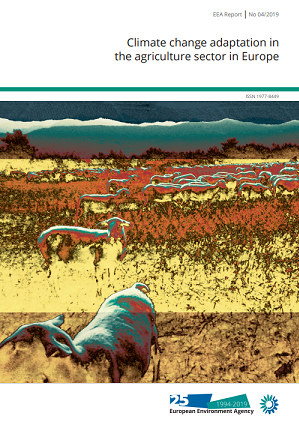European Environment Agency warns climate change threatens future of farming in Europe
- September 27, 2019
- Posted by: administrator
- Category: Agriculture, Environmental, Europe

Crop and livestock production is projected to decrease and may even have to be abandoned in parts of Europe’s southern and Mediterranean regions due to the increased negative impacts of climate change, according to a new European Environment Agency (EEA) report.
The study – Climate change adaptation in the agricultural sector in Europe – says that adapting to climate change must be made a top priority for the European Union’s agriculture sector if it is to improve resilience to extreme events like droughts, heatwaves and floods.
New records are being set around the world due to climate change, and the adverse effects of this change are already affecting agricultural production in Europe, especially in the south. Despite some progress, much more must be done to adapt by the sector itself, and especially at farm-level, and future EU policies need to be designed in a way to facilitate and accelerate transition in this sector.
Hans Bruyninckx, EEA Executive Director, commented:
“Adverse impacts of climate change are already being felt across Europe. Extreme weather, including recent heatwaves in many parts of the EU are already causing economic losses for farmers and for the EU’s agriculture sector. Future climate change might also have some positive effects due to longer growing seasons and more suitable crop conditions, but these effects will be outweighed by the increase in extreme events negatively affecting the sector.”
The report looks at the key climate change problems facing agriculture in the EU and the outlook for the years ahead. It also gives an overview of how EU policies and programmes address climate change adaptation and includes examples of feasible and successful adaptation actions. The EEA assessment is consistent with the key messages from the recent report by the Intergovernmental Panel on Climate Change (IPCC) on climate change and land.
Climate impacts have led to poorer harvests and higher production costs, affecting price, quantity and the quality of farmed products in parts of Europe. While climate change is projected to improve conditions for growing crops in parts of northern Europe, the opposite is true for crop productivity in southern Europe.
Weather and climate conditions also affect the availability of water needed for irrigation, livestock watering practices, processing of agricultural products, and transport and storage conditions.
Future climate change might have some positive effects on the sector in short term due to longer growing seasons and more suitable crop conditions in parts of northern Europe, however, water scarcity, heat waves, heavy precipitation contributing to soil erosion and other weather and climate extremes are expected to result in lower agricultural yields.
Moreover, a cascade of impacts from climate change outside Europe may affect the price, quantity and quality of products, and consequently trade patterns, which in turn may affect agricultural income in Europe.
According to projections using a high-end emission scenario, yields of non-irrigated crops like wheat, corn and sugar beet are projected to decrease in southern Europe by up to 50 % by 2050. This could result in a substantial drop in farm income by 2050, with large regional variations.
In a similar scenario, farmland values are projected to decrease in parts of southern Europe by more than 80 % by 2100, which could result in land abandonment. Trade patterns are also impacted, which in turn affects agricultural income. While food security is not under threat in the EU, increased food demand worldwide could exert pressure on food prices in the coming decades, the report says.
Adaptation at farm level is key
Most of the EEA member countries have national adaptation strategies in place. While all of these strategies include agriculture as a priority sector, only a limited number of countries included adaptation measures specific to the agriculture sector.
However, adaptation at the farm level often does not take place because of lack of financing, policy support to adapt, institutional capacity and access to adaptation know-how. The EEA report stresses that more knowledge, innovation and awareness raising are required to improve the effective use of the already available adaptation measures, like introducing adapted crops, improved irrigation techniques, field margins and agroforestry, crop diversification or precision farming (see the figure).
The practices should also lead to lower greenhouse gas and air pollutant emissions, better management of soil, land and water resources, which in turn will help preserve local ecosystems and biodiversity.
The report also suggests that EU Member States should better prioritise adaptation in the agricultural sector, for example by increasing the financing of adaptation measures through the implementation of the CAP.
Agriculture remains a driver of climate change
The agricultural sector also has a crucial role to play in reducing its greenhouse gas emissions. Agriculture accounts for around 10 % of all greenhouse gases in the EU. Methane (CH4) emissions from enteric fermentation make up the largest share and ammonia (NH3) and primary particulate matter (PM10) are the two most important air pollutants from agriculture.
While greenhouse gas emissions from agriculture have decreased since 1990, more will need to be done by the sector to contribute to reaching EU greenhouse gas emission reduction targets by 2030 and 2050.
Click here to download the report Climate change adaptation in the agricultural sector in Europe
